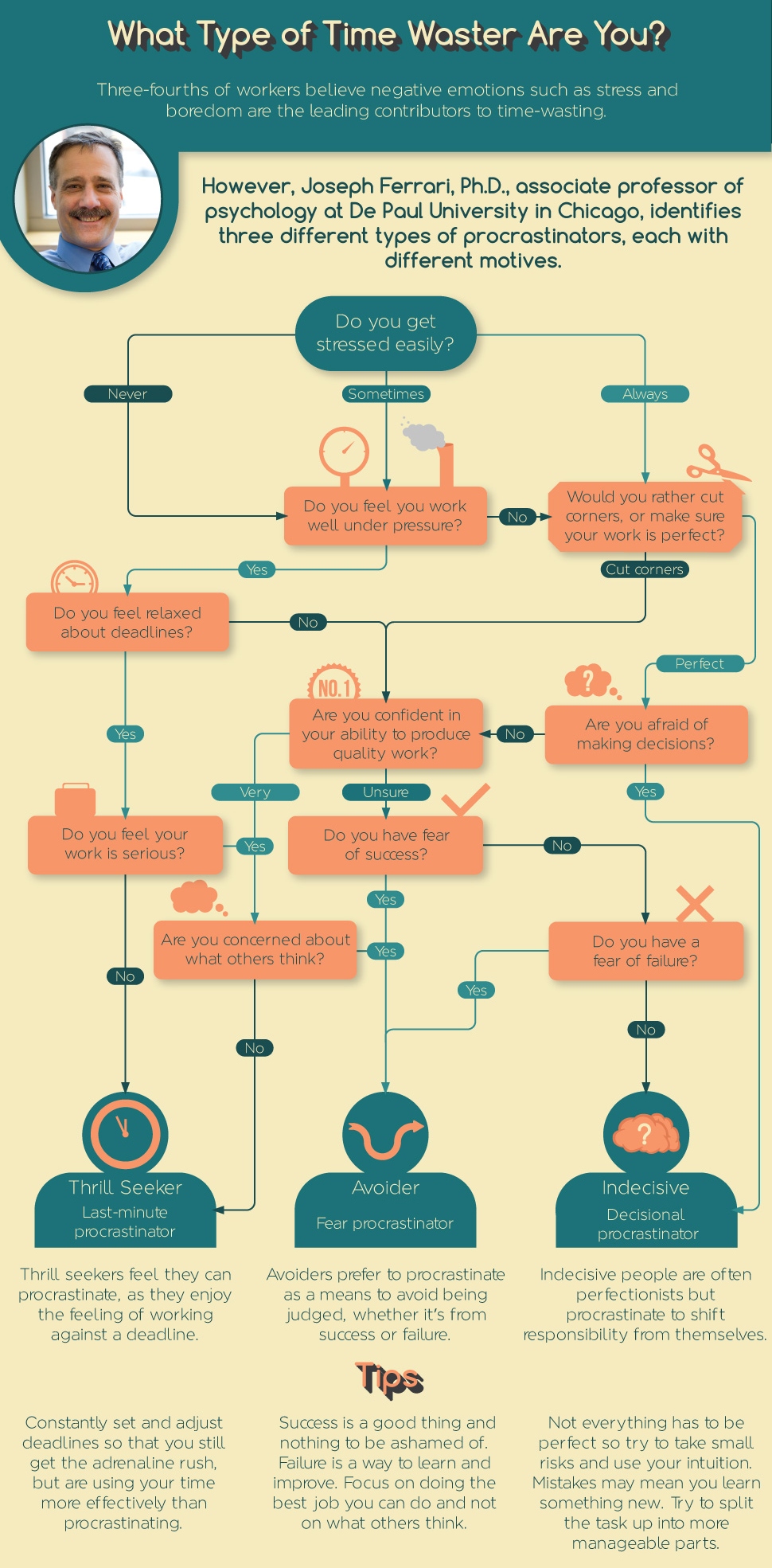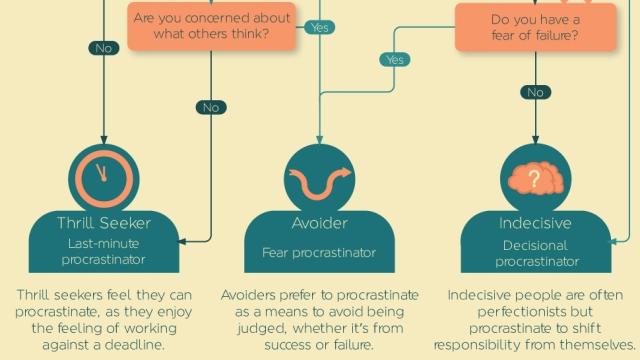Procrastinators waste too much time, but to get over this bad tendency, you need to know why you procrastinate. Dr Joseph Ferrari of DePaul University has categorised a few basic types of time-wasters, and has solutions for them too.
Dr Ferrari is the author of Still Procrastinating? The No-Regrets Guide To Getting It Done. In the book, he rounds up several studies done on procrastination by a number of psychologists, including himself. OfficeTime took his findings and created this flowchart to help you identify the type of procrastinator you are:

After identifying the type of procrastinator you are, you can lean on Dr Ferrari’s findings and advice to tackle the issue.
Thrill Seekers
Dr. Ferrari’s research shows that procrastinators who say they “work best under pressure” are probably fooling themselves. Most likely, they are wasting time by not getting started because of what psychologist M. Zuckerman calls “sensation seeking”. The race against the clock is comes with a thrill, an adrenaline rush, which is what they seek.
Dr Ferrari advises getting your rush from a different place. For example, instead of relying on the deadline for the rush, take delight in doing something well before time:
Do you want to feel good? Then complete a task when you have time to do it. You’ll experience the thrill of finishing early. Do you find (Christmas) shopping unpleasant? Make it more attractive so that you finish it before the deadline. Then celebrate! The next time you accomplish a task early, such as filing your taxes before April 15, plan a party with friends. That should make you feel good.
Ideally, make the reward something that you want and can get instantly. For example, checking out Facebook for a few minutes. Journalist Charles Duhigg says that curbing an instinct like checking Facebook is actually what makes you procrastinate after a point, because you’re fighting that instinct and it eventually explodes. So rather than that, make it a part of your schedule. Break big tasks into smaller pieces with shorter deadlines, and set up rewards.
Avoiders
Dr Ferrari says avoiders prefer to not learn more about their strengths and weaknesses in various skills. By not making a decision that impacts their own lives, they get to either stand in judgement of those who made a bad decision, or bask in the glory of a good decision made by anyone else. But in both cases, they avoid blame. To counter this, Dr. Ferrari recommends maintaining a journal:
Challenge those irrational thoughts that make you decide not to act. Try keeping a daily journal. Many things that we tell ourselves to put off doing sometimes are really not connected with the task. Instead, they are related to the feelings we have about doing the task or about the outcome if we finish the task. Keep a journal — write down your thoughts and then challenge them. What is the worst that could happen if you finish a certain task? It’s adaptive and constructive for you to know your strengths and weaknesses. If you avoid making decisions and knowing who you are, you cannot live your life to the fullest.
We have a full guide on how you can keep a personal, private journal online to log these thoughts.
Another thing that avoiders are prone to is decision fatigue, purely because they don’t exercise their “decision-making muscle” enough, Dr Ferrari says:
The key here is to practice making simple decisions and then progress to making more complex decisions — build your multithinking strength. Just as an athlete or someone training for a marathon does, you need to get your multithinking muscle in shape by frequently making decisions.
The paralysing fear of potential doom is what makes you an avoider, so make a conscious effort to make more decisions by yourself and focus on successes.
Indecisives
What the chart describes as indecisives, Still Procrastinating describes as perfectionists. We’ve already talked about how perfectionism leads to procrastination, but Dr Ferrari explains it better while talking to Fast Company:
One of the reasons people don’t finish tasks is their fear of being evaluated. “People don’t want to have their ability judged, they’d rather have their effort judged,” says Ferrari.
While perfectionists may fear negative judgments, however, perfectionists may fear the consequences of positive ones too, said Ferrari: “If I do well, you might expect more from me next time, and I don’t know if I can come through,” said Ferrari.
As French philosopher Voltaire put it so well, /”The perfect is the enemy of the good.” So how do you get over perfectionism? Dr Ferrari says the first step is to recognise that your quest for perfectionism isn’t going to get you any extra points or sympathy:
Regardless of whether you identify as a perfectionist or not, research shows there is no marked difference in the way others perceive your delay. “You’re not going to get sympathy,” says Ferrari. In other words, calling yourself a perfectionist won’t get you out of the fact that you aren’t getting things done.
Also, keep the big picture in your mind at all times. It’s easy to get caught up in the finer details, but if you know the main or larger objective and have that clear, you are more likely to prioritise what you should do. Once you’ve achieved your main goal, move on.
With these tips, hopefully you should be able to get over your procrastination problem and start getting things done. If you’re still struggling, Dr Ferrari’s book is a treasure chest of information about the subject. And you might also want to check out the full infographic at OfficeTime linked below for a few time-waster-beating strategies.
Top 10 Time Killers [OfficeTime via Lifehack]

Comments
5 responses to “Use This Flowchart To Identify The Type Of Procrastinator You Are”
I’ll do it tomorrow
What about the just plain lazy procrastinator?
thats just plain lazy
Yeah, I got “thrill seeker” and I have to say.. I do not get a thrill out of working against a deadline. I just generally CBF.
I’m apparently the sort of procrastinator that reads that damn flowchart.
I procrastinate by working full time and not taking time out to study like I should. I tend to wait until I don’t have much time to do my assignments to get them turned in on time. I put too much on my plate!
I am the indecisive procrastinator, I don’t know why but I”ll do half and may not finish all.
I feel like an indecisive procrastinator too. I have a feeling inside that I must do things right, whether it be my work or college. If I have a problem with my assignments I just feel like I’m falling apart. Then I become insecure about if I can do this or not.